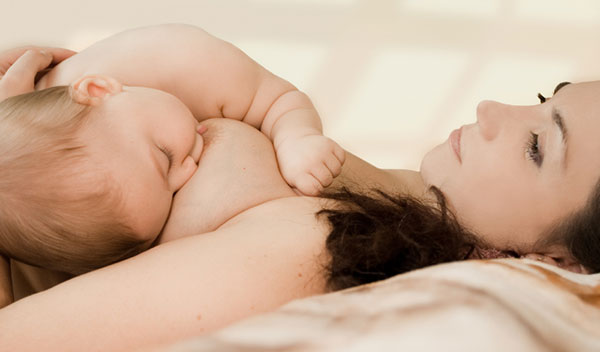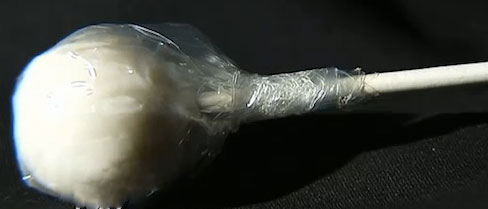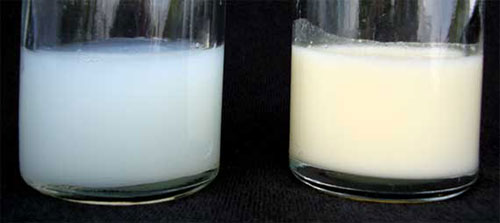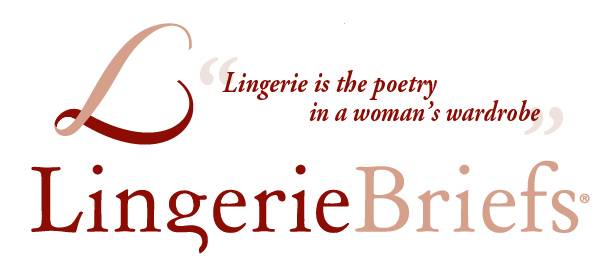The Rising Price of Breast Milk
By Elisabeth Dale

Two studies this week brought more news of the value of breastfeeding. The first was research showing that exclusively breastfed babies, when compared to those fed formula, received an extra boost to their brains. The second found that increased rates of breastfeeding led to millions of dollars saved in health care costs, from reducing the incidence of breast cancer, hypertension, and heart disease. These stories emphasized the medicinal properties of breast milk, how well it can protect and enhance not just the health and well being of mother and baby, but society at large.
Then I read about a new breast milk flavored lollipop. There’s no actual breast milk involved in the making of this candy. It simply attempts to replicate the taste of mother’s milk. Created by Lollyphile (makers of Wasabi-Ginger, Chocolate Bacon, and a host of other liquor inspired flavors), the idea was to provide a toddler with a soothing and familiar taste. After all, if breast milk can stop a baby’s cries, why shouldn’t an all vegan substitute have the same effect? Breast milk flavored lollipops are priced at $10 for a set of four pops.

How does the cost of breast milk compare to this artificial confection? A year’s supply of human milk could run you $35,000. Formula companies spend millions of dollars attempting to replicate the qualities, not just the flavor, of breast milk. It’s a poorer substitute, but a cheaper and acceptable alternative. A year’s supply of powdered formula can add $1500 to $2000 to your family’s food budget. When you factor in other hidden costs of breastfeeding, such as lost wages from work, the price may be even cheaper.
Maybe we’ve made breastfeeding too expensive. That could be why new moms begin with good intentions but inevitably fall short of fulfilling the six-month recommended goal. Media reports underscore the benefits of breast milk, yet new mothers are offered little tangible support to help them succeed. Maternal leaves are brief, private rooms or paid break times to pump milk during work are rare, lactation specialist services expensive, and efficient electric breast pump rentals pricey. There’s even an emotional cost in shaming publicly breastfeeding mothers. Women are damned if they do and damned if they don’t.
Do we value breast milk? Not really. We value it in a superficial kind of way, as if it were a confection like the breast milk lollipop. Not as the prescription medicine it represents. (Imagine an equivalent Viagra flavored lollipop.) This fact isn’t lost in formula company advertisements and promotions, either. We’ve just made it easier and cheaper to feed babies the artificial stuff.
We don’t want to pay the real price of breast milk: the breastfeeding part of the equation. We don’t even want to pay women to pump breast milk. Instead we blame new mothers for “choosing” not to breastfeed. And we don’t appreciate the efforts of those mothers that do nurse, criticizing them for doing it too long, not long enough, or too openly.
The irony is that breast milk is far more valuable to the human race than any man made compound. Ignoring that fact may cost more than anyone imagined.
What’s your view? Should women receive more tangible or even intangible (emotional) support for breastfeeding? Does it matter?


I posted this article this morning on a mom-based page that I moderate on Facebook because I found that I agreed with the overall message and I too believe that breast-feeding in this country is not respected or supported enough.
That being said however, I have been racking my brain ever since trying to come up with what in the world could possibly cost a breast-feeding mother up to $30k per year or more, in order to do it! I understand your consideration for lost wages and yes- if we are only considering lost wages for stay-at-home moms who have left their careers to breast-feed their children, it would totally add up to that much or more per year, but in the article you offer the loss of wages number in addition to the average, overall cost of $35,000!
My only thought was sure, every woman has the choice- they can either breast-feed on the cheap or breast-feed like a rock star in which case, it might add up to a few thousand In fancy, designer nursing bras, nursing shirts and nursing covers, supplements and teas, but there is no way in the world that nursing one child for 365 days will cost you more than a car. At least not that I can think of, and I’ve been nursing and two babies for the last year and total, for 2 1/2 years.
Maybe I’m spending a lot more than I realize, so I was wondering if you could share what that cost breakdown actually is?
Hi Janelle. Thanks for sharing my post on your page! Much appreciated. The $35K cost I refer to in the blog is connected to two links: one on a page that estimates that the cost of purchasing breast milk at $20K to $35K (from ‘human breast’ Milk Bank) and the other linked to formula costs (click ‘$1500 to $2500’). The third link (in “hidden costs”) is to a New York Times piece about the various costs associated with what we think of as “free milk” (i.e. time lost from work in unpaid breaks to pump, etc.). The bottom line is that your breast milk is PRICELESS. Imagine if it we were able to put it’s benefits in capsule form? What amount would be pay in research and development to come up with such an important compound? (Maybe we should ask this of the formula companies?) Please let me know if the above makes sense and if I can clear up any confusion the blog might have created re cost.
I think this is a very good question. There are some great resources like Best for Babes that discuss the “booby traps” of breastfeeding:: http://www.bestforbabes.org/what-are-the-booby-traps. Other than these support groups, I think women are made to feel guilty if they do, or if they don’t! I’ve heard both sides. There should be more acceptance of choosing your own path (not unlike making choices in child rearing).
Great story
Would love to add or create a follow up on the guilt women feel when they can’t breastfeed. My daughter pumped for 3 months just to create the smell on her body, but because she is on medication that she must take for an illness, she was advised not to breastfeed. What does the industry do to help the emotional fall out for women who want to breastfeed and can not?